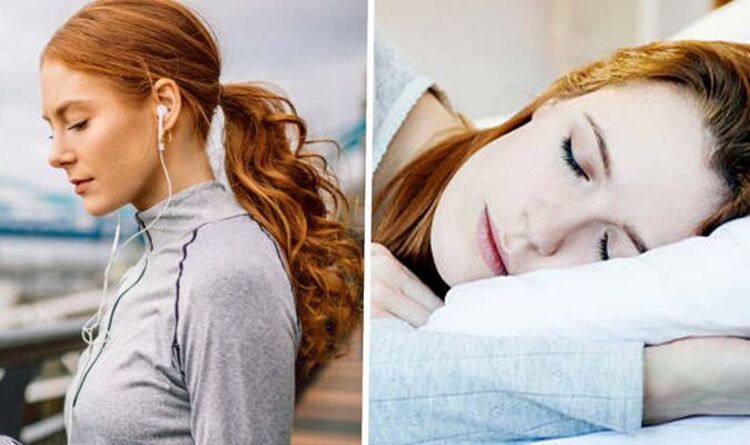Expert explains why enjoying exercise is important
We use your sign-up to provide content in ways you’ve consented to and to improve our understanding of you. This may include adverts from us and 3rd parties based on our understanding. You can unsubscribe at any time. More info
The Sleep Foundation notes researchers are still working to understand exactly how physical activity affects sleep, though they’ve found that moderate aerobic exercise is the most effective at relieving insomnia. It says: “Specifically, moderate aerobic exercise increases the amount of time you spend in deep sleep. Deep sleep is the stage where your body restores and replenishes itself, healing your muscles and tissues to prepare for more exercise.”
The organisation says: “Moderate aerobic exercise can help relieve other symptoms associated with insomnia, too.
“For individuals with comorbid insomnia and anxiety, it can significantly lower pre-sleep anxiety, reducing the anxious thoughts that make it tough to fall asleep.”
The Johns Hopkins University health site says: “Recent research indicates that exercise decreases sleep complaints and insomnia in patients.
“The effects of aerobic exercise on sleep appear to be similar to those of sleeping pills. However, more research is needed to compare physical exercise to medical treatments for insomnia.”
READ MORE: Cancer symptoms: Numbness of the tongue could signal a ‘medical problem’

Indeed, the NHS says lack of exercise can mean your body is not tired enough to need much sleep.
Nonetheless, it says: “Try to avoid exercise too close to bed as this can make us feel more alert and have a negative impact on our sleep.
“However, exercise during the day can make us feel more tired at bedtime so try and make some form of exercising part of your daily routine.”
Sleeping can be a challenge for some people, who might be distracted by the stresses of their daily lives, or unable to fall asleep even when they are feeling tired, and there are also some other tips to try.
For most, sleep problems tend to sort themselves out within about a month, according to the NHS.
People with insomnia will regularly find it hard to go to sleep, can wake up several times during the night and lie awake at night.
They might also find it difficult to concentrate during the day because they are tired, or wake up early and find they cannot go back to sleep.
If you have insomnia for less than three months, it is called short-term insomnia. Insomnia that lasts three months or longer is called long-term insomnia.
“Some people are naturally lighter sleepers or take longer to drop off, while some life circumstances might make it more likely for your sleep to be interrupted, like stressful events or having a new baby,” the NHS states.
If poor sleep is affecting your daily life or causing you distress, you can talk to your GP.
As well as trying the paradoxical intention technique, there are several other methods to get a better night’s sleep.
The NHS recommends that you keep regular sleep hours, create a dark and quiet and cool environment.

The health body adds that some people find it useful to write down their worries and concerns, and set aside time before bed to make a list for the next day, if these stresses keep you awake.
Caffeine and alcohol can stop you falling asleep and prevent good quality sleep. Therefore, it is recommended that people cut down on alcohol and avoid caffeine close to bedtime.
Everyone needs different amounts of sleep. On average adults need seven to nine hours, while children need nine to 13 hours. Toddlers and babies need 12 to 17 hours of sleep, every day.
“You probably do not get enough sleep if you’re constantly tired during the day,” states the NHS website.
Source: Read Full Article
